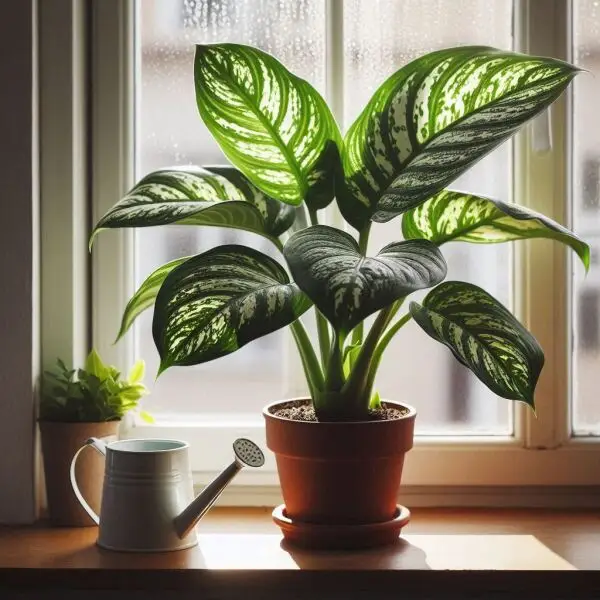The Most Beautiful Yet Dangerous Plants for Your Home and Pets
Discover the most beautiful yet dangerous plants for your home. Learn about their toxins and what to do in case of poisoning to protect your family and pets....
Table of Contents
- Indoor Plants: Beauty and Danger
- Symptoms of Poisoning
- Poisoning in Pets
- What to Do in Case of Poisoning?
Follow Patricia Alegsa on Pinterest!
Indoor Plants: Beauty and Danger
Indoor plants beautify any space in our home, but behind their appeal, some hide a not-so-obvious danger. Several common species found in homes and gardens possess toxins that can be harmful to both humans and pets.
Since time immemorial, humans have used plants both for food and to treat illnesses. However, this ancestral wisdom also includes knowledge of poisonous plants, capable of causing lethal effects.
Plants such as pothos, split-leaf philodendron, and hydrangea are just a few that require careful handling.
Plants such as pothos, split-leaf philodendron, and hydrangea are just a few that require careful handling.
According to experts like Sergio Saracco, a medical toxicologist, plants from the Araceae family are particularly dangerous, especially if ingested by children. These plants contain calcium oxalates, which can cause intense pain and inflammation when chewed.
The symptoms of ingesting toxic plants usually present themselves immediately.
Symptoms of Poisoning
The symptoms of ingesting toxic plants usually present themselves immediately.
The burning pain in the lips and mouth, along with swelling of the tissues, are the most common signs. This can hinder speech, which is why Dieffenbachia is known as "dumb cane."
Other plants, such as hydrangeas, contain cyanogenic glycosides that can cause vomiting and diarrhea. It is important to note that poisoning occurs only if parts of the plant are ingested, which poses a particular risk to small children and pets.
Pets, with their innate curiosity, may bite or chew on houseplants, which can lead to poisoning. Some plants, such as Paraguayan jasmine and lilies, are highly toxic to them.
Poisoning in Pets
Pets, with their innate curiosity, may bite or chew on houseplants, which can lead to poisoning. Some plants, such as Paraguayan jasmine and lilies, are highly toxic to them.
According to María Soledad Iramain, a veterinarian, many of the ornamental plants we have at home can cause digestive problems and, in severe cases, renal or hepatic damage. For example, ingestion of lilies by a cat can be fatal, while the false palm can cause irreversible liver damage in dogs.
In case of poisoning, both for humans and pets, it is crucial to act quickly.
What to Do in Case of Poisoning?
In case of poisoning, both for humans and pets, it is crucial to act quickly.
Experts recommend going to an emergency room with a sample of the plant or a photo to facilitate diagnosis.
It is important not to induce vomiting, especially if the ingested plant is unknown, as this could worsen the situation. In the case of pets, medications or home remedies should never be administered without the supervision of a veterinarian.
Knowing the plants we have in our homes is essential to avoid poisoning.
Knowing the plants we have in our homes is essential to avoid poisoning.
By identifying high-risk species, we can take preventive measures such as keeping them away or even removing them if necessary. Education on this topic can save lives, both human and of our beloved pets.
Subscribe to the free weekly horoscope
Aquarius Aries Cancer Capricorn Gemini Leo Libra Pisces Sagittarius Scorpio Taurus Virgo
-
 Discover the fruit rich in Vitamin D, excellent for your bone health
Discover the fruit rich in Vitamin D, excellent for your bone health
Discover the fruit that shines in vitamin D, crucial for your bones and well-being. Beyond the sun and fish, this delight will surprise you. -
 Live to be 120 years old: how to achieve it without spending millions
Live to be 120 years old: how to achieve it without spending millions
Millionaire Bryan Johnson spends 2 million dollars a year on his health to live up to 120 years old. I will show you what he does and how you can do it for much less money. -
 The Natural Secret of Carrot Juice for Radiant Skin and Steel-Strong Immunity
The Natural Secret of Carrot Juice for Radiant Skin and Steel-Strong Immunity
Discover carrot juice: improve your skin, protect your heart, and strengthen your immunity with this healthy and delicious natural power. -
 Study reveals an increase in cancer among young people: Why?
Study reveals an increase in cancer among young people: Why?
Study reveals an increase in diagnoses among young people between 2000 and 2019. The most common cases are identified and the causes of this increase are investigated. -
 Take Care of Your Brain: A Guide to Preventing Alzheimer’s with Diet and Habits
Take Care of Your Brain: A Guide to Preventing Alzheimer’s with Diet and Habits
Discover how to take care of your brain and reduce the risk of Alzheimer’s with our comprehensive guide on dietary changes and healthy habits. Start today!
I am Patricia Alegsa
I have been writing horoscope and self-help articles professionally for over 20 years.
Subscribe to the free weekly horoscope
Receive weekly in your email the horoscope and our new articles on love, family, work, dreams and more news. We do NOT send spam.
Astral and numerological analysis
-
 Discover your future, secret personality traits and how to improve in love, business and life in general
Discover your future, secret personality traits and how to improve in love, business and life in general
-
 Online Dream Interpreter: with artificial intelligence
Do you want to know what a dream you had means? Discover the power of understanding your dreams with our advanced online dream interpreter using artificial intelligence that responds to you in seconds.
Online Dream Interpreter: with artificial intelligence
Do you want to know what a dream you had means? Discover the power of understanding your dreams with our advanced online dream interpreter using artificial intelligence that responds to you in seconds.
-
 Tuna: Health Benefits and How to Avoid Mercury Risks
Tuna: Health Benefits and How to Avoid Mercury Risks
Discover the health benefits of tuna and learn how to minimize mercury risks. Find out the recommendations from experts on safe consumption. -
 6 ways to keep your nails healthy and recognize when they are brittle
6 ways to keep your nails healthy and recognize when they are brittle
Discover how to keep your nails healthy and when they are a sign of problems. Learn effective treatments to strengthen brittle and fragile nails. -
 Sex addiction: how much is too much? When to seek help?
Sex addiction: how much is too much? When to seek help?
Sex addiction: discover how to manage the compulsive behavior that impacts your relationships and work life. Learn when to seek professional help. -
 Trend of influencers eating eggs with shell: What benefits does this bring?
Trend of influencers eating eggs with shell: What benefits does this bring?
Several influencers on Instagram, Facebook, and TikTok are recommending eating boiled eggs with the shell: is this healthy? Does it have any health benefits? -
 The ideal diet after 40 years: keys for muscle, energy, and a healthy mind
The ideal diet after 40 years: keys for muscle, energy, and a healthy mind
Discover what to eat after 40: key foods to strengthen muscles, energy, and mind, according to health and nutrition experts. -
 Benefits of chia seeds: how many should I consume per day?
Benefits of chia seeds: how many should I consume per day?
Discover the incredible benefits of chia seeds for your health and learn how many to consume daily to take advantage of their fiber, omega-3, and essential minerals. -
 What is the Best Time of Day to Bathe and Its Benefits
What is the Best Time of Day to Bathe and Its Benefits
Discover the best time of day to bathe and its benefits for your health. Expert tips for choosing the perfect schedule according to your lifestyle. -
 It's not a manipulated photograph! Green capybaras found in Argentina
It's not a manipulated photograph! Green capybaras found in Argentina
Green alert in Entre Ríos, Argentina! Hulk-style capybaras surprise in the city of Concordia. The bacteria dyed them in Lago Salto Grande. Do you take precautions? -
 What does it mean to dream of concerts?
What does it mean to dream of concerts?
Discover the meaning of dreaming about concerts and how these dreams can reflect your hidden desires and deepest emotions - read our article now! -
 What does it mean to dream of nostalgia for a place?
What does it mean to dream of nostalgia for a place?
Discover the meaning behind your dreams of nostalgia for a place. Read our article and find out what messages your subconscious is sending you. -
 What does it mean to dream of scissors?
What does it mean to dream of scissors?
Discover the meaning of your dreams with scissors and how they can influence your life. Learn tips to make important decisions and achieve your goals. -
 A story of a breakup: overcoming emotional grief
A story of a breakup: overcoming emotional grief
Discover the profound journey of emotional grief: a complex process that reveals its pain over time. A reflection that invites healing. -
 What does it mean to dream of the end of the world?
What does it mean to dream of the end of the world?
Discover the meaning behind apocalyptic dreams with our article on What does it mean to dream of the end of the world? Wake up with a new perspective on your dreams!